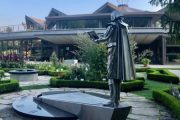This is story #53 in the series “Where Exactly is Home?”. It's the last story in the Rhodesian part of the author's life. The author recommends you read them in order.
Introduction:
“Where Exactly is Home?” follows the story of my parents, my two younger brothers and me, Susan, who emigrated from war-battered Britain, in the mid-late 1950’s, to Southern Rhodesia, Africa.
The effects of this move on our family were huge, as we struggled to adapt to such a different way of life. Only after further upheaval, and more long-distance travelling, did our family eventually settle in the city of Salisbury, Rhodesia.
However, we did not know then that we would not remain there for the rest of our lives, either.
When the family first went to Africa, I, Susan, was 9 years old. My two brothers, John and Peter, were almost 7 and 4, respectively.
Nowadays, as seniors, John and Peter live in England. I live in Canada. Throughout our lives, we have both benefitted from, and suffered because of, our somewhat unusual childhood.
I, for one, still sometimes ask myself which country represents home to me.
This is a series of stories under the title "Where Exactly is Home?" - I recommend you read them in order, starting with story #1.
53. Seeking Employment and a Place to Live, 1972
I recently read George Orwell’s book “Down and Out in Paris and London” (1933), in which he describes his own poverty as he struggled to survive in both cities. Washing dishes in the kitchens of French restaurants, living hand to mouth with no fixed abode, and never knowing where the next meal was coming from, he paints a very bleak picture of what it meant to be poor in two such wealthy cities. His book aimed to shock those of the well-educated upper classes who had little idea that such circumstances existed.
I look back at those early months of 1972 when I had just moved back to Britain and realize that although I was desperate to find a job, I never landed up working long hours in appalling conditions, scrounging meals, sleeping rough, as did George Orwell. I was lucky. I had some idea of where I was going. I had to survive for two or three months. If all went well, I could get a position as a high school teacher from April onwards, so I simply needed a menial job of some kind to tide me over till then.
I began by reading the Times Educational Supplement, a weekly publication which included educational articles and advertisements for upcoming educational positions. I scoured the paper for private schools offering vacant posts, since I had a misguided viewpoint that, unless I were in a private establishment or in a more academic grammar school, I would be surrounded by loutish students wielding knives and bicycle chains. I was 24, frightened of having to cope with any such behaviour.
It was in the Times Educational Supplement that I saw an advertisement for the Gabbitas-Thring Educational Trust, which sought both teachers and students for their private schools. I had never heard of such an organization but there was an office in central London. Perhaps, if I went there in person and explained my circumstances, the company could find me a job or at least advise me as to what best to do.





